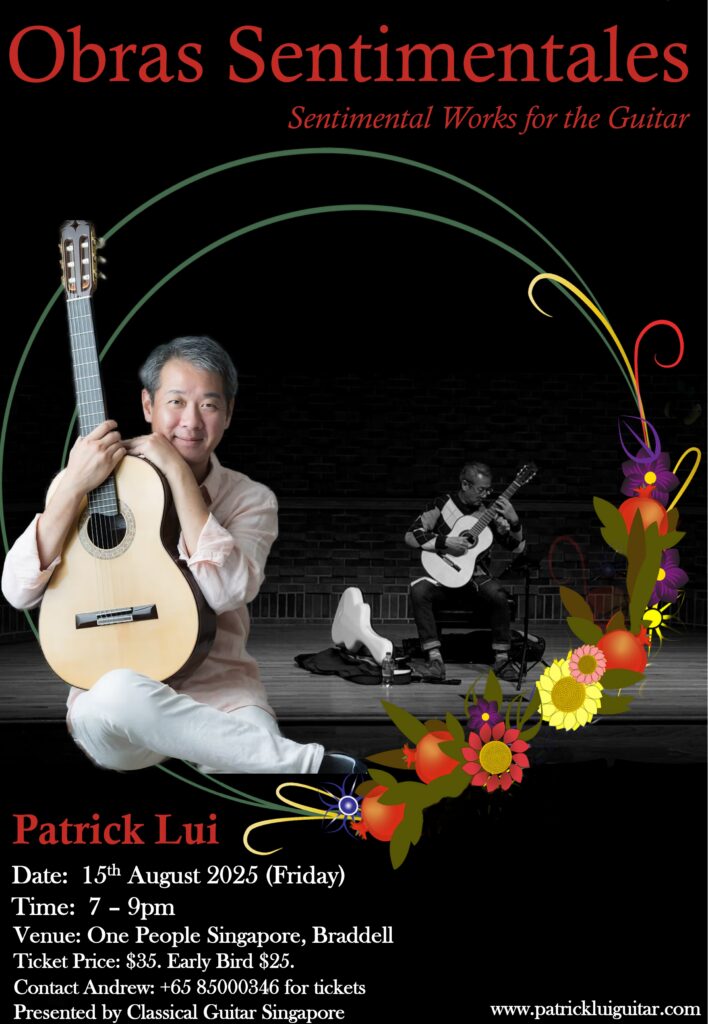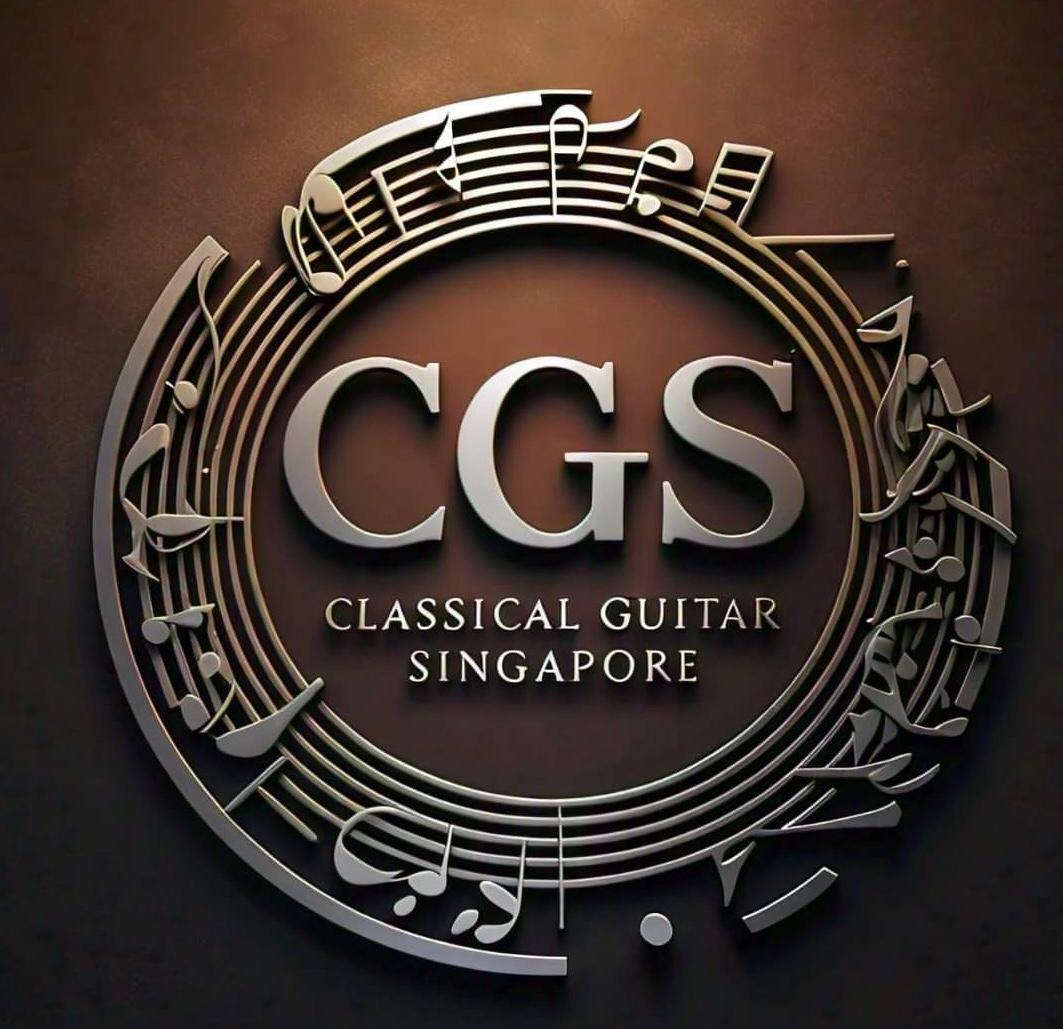
In September 2024, Classical Guitar Singapore[CGS] received news that American Guitarist, Patrick Lui has relocated to Singapore indefinitely. His presence got our guitar community excited and since then, Patrick has quickly acclimatised to the Singapore culture, food and people. Andrew from CGS recently caught up with Patrick and talked about his guitar life and his upcoming concert on 15th August 2025.
Andrew: What drew you to the classical guitar, and how did your early experiences shape your commitment to it?
Patrick: I dabbled in piano a little as a child, but it was never anything serious. One summer, after finishing a job, I bought a guitar on clearance—mostly so I could justify to my father how I had managed to spend my entire paycheck in just a couple of weeks.
At first, the guitar just sat in the corner collecting dust. But eventually, I started taking lessons—mostly folk-style, simple strumming and chords. But every time my teacher showed me a melody, I’d ask, “Where’s the accompaniment?” And when he showed me chords, I’d ask, “Where’s the melody?” After a couple of months of this back-and-forth, he finally said—probably out of some frustration—that maybe classical guitar would suit me better.
So, I switched to a class that used the Yamaha Guitar Method. Honestly, I had no idea what I was doing. Reading music was very challenging. Maybe it was because the others in the class were slightly older and had more experience, or maybe I just wasn’t as sharp as I like to think I was. After finishing the 3-month fundamentals course, I asked if I could take the beginner course again. I later found out I was the first—and only—student to ever do that.
But the second time around, things started to click. I progressed quickly, was moved out of the class, and began private lessons. A couple of years later, I was invited to teach for the Hong Kong Guitar Society and at Tom Lee Music, where I taught the Yamaha Guitar Method.
I was very lucky. Back then—about forty years ago—there weren’t many great teachers or resources in Hong Kong, but there were a lot of passionate enthusiasts. I learned a lot from them at the Hong Kong Guitar Society. I even managed to win a few prizes before and during my studies at the Hong Kong Academy for Performing Arts (HKAPA).
At the end of my second year at HKAPA, my teacher at the time, Susan McKeithen, told me she was leaving Hong Kong. Unbeknownst to me, she had already applied for me to study at the North Carolina School of the Arts under Aaron Shearer. And that’s how I ended up in America.
Andrew: You were originally from Hong Kong, then pursued undergraduate studies at the North Carolina School of the Arts, followed by postgraduate studies at Arizona State University with Aaron Shearer and Frank Koonce. You’ve now lived, taught, and performed in the U.S. for over 40 years. Looking back, what are some of your most memorable moments?
Patrick: I’ve been fortunate in so many ways and received tremendous support and opportunities. Contrary to what some may believe, I wasn’t from a wealthy family. My parents were incredibly loving and supportive, but financially, they simply couldn’t afford to send their children overseas. Even with full scholarships and assistantships, I still had to work extremely hard just to get by.
Those school years were tough—but I wouldn’t trade them for anything. The North Carolina School of the Arts, often called the “Juilliard of the South,” was in Winston-Salem, a small city with a very small Asian community at the time. That, oddly enough, was a blessing—it forced me to assimilate and grow.
I’ve also been lucky in that, throughout my 40 years in the U.S., I’ve never experienced racism. And if anyone ever did call me something unpleasant, I probably worked hard to earn it! [laughs]
Studying with Aaron Shearer was challenging. He was a very demanding teacher, but beyond his reputation and expertise, what truly made the experience special was the environment he fostered. He attracted talented students from all over the world and encouraged us to learn from each other. We had a small, close-knit department, and many of my classmates have become lifelong friends and colleagues. While I improved a great deal under his guidance, I believe the biggest impact was on my development as a teacher. I wouldn’t be the teacher I am today without those years.
After four years with Shearer, I studied with Frank Koonce, a brilliant Bach scholar. Frank was a very kind and supportive teacher. He gave me the tools and knowledge I needed, but more importantly, he trusted me. He gave me the freedom to grow as a performer and teacher. Without him, I wouldn’t be who I am today.
It’s been a long time since I studied with these great men. As much as I’d like to say I’m a protégé of Aaron Shearer or Frank Koonce, I don’t strictly teach their methods. I don’t quote Shearer’s books or follow Koonce’s teachings verbatim. I’ve evolved—as we all should. Twenty years ago, I might’ve thought I knew everything about teaching guitar. Now, I can only say that I know what I know, and I teach what works for me. I’m still learning every day.
Andrew: America has a very rich environment for nurturing classical guitar—competitions like the GFA, numerous societies, conservatories, and festivals. How have these contributed to your guitar life over the last 40 years?
Patrick: The classical guitar world has changed a lot over the past forty years. There was a time when only a few names dominated the field. Now, there are great teachers and players everywhere.
I do think the American approach—hard work, initiative, and networking—has really helped the guitar scene grow. Today, competitions and festivals are everywhere. For young performers, these are not just opportunities to showcase their skills, but more importantly, to connect with others. That networking is often more valuable than any lesson or masterclass.
One of the best things about the American guitar community is that it doesn’t matter what your skin color or gender is—it’s about what you can do and how well you work with others. Yes, the competition is real, but the camaraderie is even stronger. People support each other, and that creates a healthy environment for the guitar to thrive. I’m deeply grateful for that, because it allowed someone like me to flourish.
Andrew: What instruments do you currently own and perform on?
Patrick: I’ve owned nearly 30 concert guitars over the years, though I’m not really a collector. I can’t afford to be! So, usually when I buy a new one, I sell another.
Since 2000, I’ve been playing guitars made by Andrea Tacchi. The one I’ll be using for the August 15th concert is the fourth one he built for me—a 2020 spruce-top Collecchia model. I love it. I also have a guitar made by his son, Giovanni Tacchi, and another by Donatella Salvato. Both the Bio Tacchi and Salvato draw inspiration from Daniel Friederich’s guitars but have unique voices of their own.
That said, I haven’t touched the other two in over a month and a half—I’ve already decided I’ll use the Andrea Tacchi for the concert. I always say, choosing a guitar has less to do with finding “the best” instrument and more to do with what feels right in your hands. I admire people who can switch instruments frequently. I’m not one of them!
Interview by Andrew Wee
Catch Patrick’s concert on 15th August 2025 at One People Singapore, Braddell. Tickets on sale from Andrew (Text +65 85000346)

